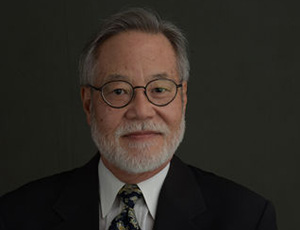Views expressed by any party interviewed by Ideaspace are those of the interviewee and are not necessarily shared by Ideaspace.
The following is a transcript of the video briefing above, lightly edited for clarity and presented here to enable users to search the participants’ comments.
DW Gibson:
My name is DW Gibson and I’m part of the team at Ideaspace. We are a 501(c)4 that strives for a fresh and even-handed portrayal of thought leaders and their ideas and for bipartisan legislative action and support are the most promising of those ideas. We want to tackle some of the most intractable issues of our times, and so we focus most of our work on immigration. You can check out all of our interviews, research and analysis at Ideaspace.com. Today we’re talking about worker visas. How can more visas for foreign workers help the country meet its economic needs? Where are the needs for more workers greatest, and what effect might the expanded use of worker visas have on the challenges at the southern border?
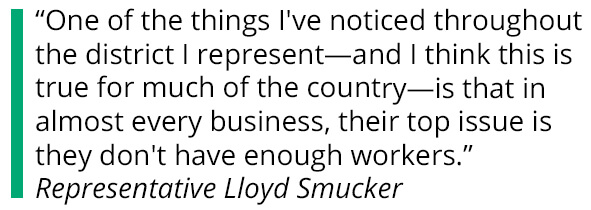 We’re grateful to have three important perspectives today to help us address these questions. I’m joined by Representative Lloyd Smucker, who serves Pennsylvania’s 11th Congressional District and has been a member of the House since his election in 2016. Also with me are Theresa Cardinal Brown and Randel Johnson, two co-authors of the white paper, “Immigration Reform: A Path Forward,” which was published by Cornell University Law School’s Immigration Law and Policy Program. In addition to her role as a distinguished fellow at Cornell, Theresa Cardinal Brown also serves as a senior advisor at the Bipartisan Policy Center.
We’re grateful to have three important perspectives today to help us address these questions. I’m joined by Representative Lloyd Smucker, who serves Pennsylvania’s 11th Congressional District and has been a member of the House since his election in 2016. Also with me are Theresa Cardinal Brown and Randel Johnson, two co-authors of the white paper, “Immigration Reform: A Path Forward,” which was published by Cornell University Law School’s Immigration Law and Policy Program. In addition to her role as a distinguished fellow at Cornell, Theresa Cardinal Brown also serves as a senior advisor at the Bipartisan Policy Center.
Randall Johnson has worked on employment and immigration law for 25 years at the US Chamber of Commerce and elsewhere before becoming a distinguished fellow at Cornell. I’m grateful to all three of my guests for joining me today and Representative Smucker, it’d be great to start with you. We’re particularly excited to talk to you because of the piece of legislation you introduced last year called The Essential Workers for Economic Advancement Act. If you would, please just give us a general sense of the contours of the bill and what effect you hope it might have on your constituents and beyond, if enacted.
Representative Lloyd Smucker:
Thanks DW, and I look forward to the discussion with the other panelists here this morning. I appreciate the opportunity to be with you. One of the things I’ve noticed throughout the district I represent—and I think this is true for much of the country—is that in almost every business, their top issue is they don’t have enough workers.And so we see that played out in restaurants that have restricted their hours. They may be closed on a particular day of the week. We see it in manufacturers who just simply do not have enough people to keep their lines going to meet demand. We see it in our healthcare workers. The hospitals in my area have a severe shortage of nurses. You see this everywhere and I think almost every business owner you ask, it’s the number one issue.
And to address this, there are a number of things that we can be doing including policies that try to improve our labor workforce participation rate and a number of other things. But, specifically, we just aren’t producing enough workers internally. Our birth rate is down and our demographics are such that we don’t see a solution to this unless we find other ways to bring people into the country. And I think we’ve always been a country that welcomes individuals to come here, to live the American dream, to provide for their family, look for more opportunity. So I think we have a history of bringing people into the country who want to live that American dream. And that’s what I think we should be doing right now. And I think to take this even into a broader perspective, I serve on the Ways and Means Committee and on the Budget Committee, and look at a lot of the economic issues and the debt and the fiscal trajectory that we’re on.
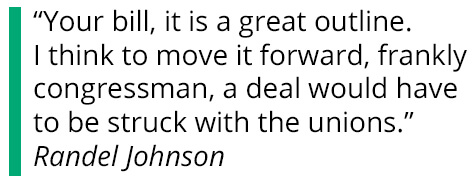 And I’m very concerned about what that looks like 10, 20 years from now. If we do not change that trajectory, we’re in for a shocking economic event. It’s very hard to [address] that if we aren’t growing the economy at a faster clip than we are now. We’ve historically been at about 3% economic growth. We’ve had periods where we’ve even had 4% economic growth for short periods of time, but on average for the past 50 years or so, I’m rounding the numbers here, but we’ve generally grown at about 3%. Today the CBO is projecting that we will only grow at about half that rate for the next 30 years. And that means less people paying into social security. That means less revenues coming in to fund our government. It’s just not sustainable. One of the ways you begin to solve that is by providing more workers.
And I’m very concerned about what that looks like 10, 20 years from now. If we do not change that trajectory, we’re in for a shocking economic event. It’s very hard to [address] that if we aren’t growing the economy at a faster clip than we are now. We’ve historically been at about 3% economic growth. We’ve had periods where we’ve even had 4% economic growth for short periods of time, but on average for the past 50 years or so, I’m rounding the numbers here, but we’ve generally grown at about 3%. Today the CBO is projecting that we will only grow at about half that rate for the next 30 years. And that means less people paying into social security. That means less revenues coming in to fund our government. It’s just not sustainable. One of the ways you begin to solve that is by providing more workers.
So, again, immigration helps us solve those problems. We already have some worker programs, several different ones. One that I’d like to mention is the H-2B visa program, which allows for seasonal workers for only a portion of the year. So this is often used by agriculture for doing harvest and jobs of that nature, but we have really nothing equivalent to that for year-round workers. And while H-2B can work for ag[riculture], it doesn’t work for some of the other areas that I mentioned. Construction workers are generally needed year-round unless you live in a really cold climate, maybe not, but certainly hospitals need nurses. There are a lot of industries–hospitality, restaurants–that need year-round workers. And so this bill attempts to address that by implementing or instituting an entirely new visa program that would provide for year round workers.
And it starts really, really small, not nearly enough to meet the demand. It would start with only 65,000 workers per year. That number could fluctuate based on economic conditions. You almost have to look at it as a kind of a pilot program or a test program because obviously those numbers need to be much, much higher than that to really have an impact. But it would be a start. There are provisions in the bill that [verify] that those jobs can’t be filled by American workers. So the unemployment rate has to be below [7.9%]. And the employer needs to show that there’s been an attempt to fill that job before they bring in workers through that visa program. So that’s the outline of the bill. I’m happy to talk a lot more about it, but really looking forward to discussion.
DW Gibson:
I’m glad that you touched on both aspects of the bill in terms of meeting the needs of constituents, you have needs in the healthcare industry and so forth and construction industry, but also talking about protecting American workers at the same time, right? Both of those facets. The bill works in both ways. Randy, I want to turn to you. When you and your fellow co-authors were outlining the most pressing and politically possible pillars of immigration reform, you highlighted Representative Smucker’s bill as an example of legislation with some promise. Talk a little bit more about why the focus on this bill, and how you see it fitting into the larger picture you paint of a more expansive approach to worker visa programs.
Randel Johnson:
Let me just give a little background and echo in your comments, congressman. I did spend 20 years at the Chamber [of Commerce] as senior vice president for Labor, Immigration, Healthcare and Pensions. Needless to say, I had big issues dealing with the unions on labor law reform or on pension reform, multi-employer issues, even Obamacare, wage and hour issues. But in the background there was always this buzz, “Okay, Randy, that’s great, but what about our worker shortages? What’s the Chamber going to do about that?” And it continued to grow over my 20 years there. One time my boss, Tom Donahue, came to me and said, “What about immigration, Randy? Do you want to handle that? How difficult could it be?” At the time I’m like, “Yeah, how difficult could it be? [Laughs] I can do that, Tom.” I didn’t get a raise, but I still undertook the issue.
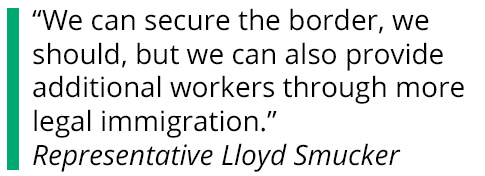 And that led to—as Theresa knows—negotiations with the SEIU [Service Employees International Union] and we created a worker program. I thought it was a good bill, but the AFL-CIO didn’t and they opposed it with over-the-top rhetoric. But then subsequent to that, at the request of [John] McCain and [Edward] Kennedy and [Lindsey] Graham and others, we sat down with the AFL-CIO and negotiated what was called the W Visa program, S.744. I’m just giving a little bit of that background, that kind of led to the construct of your bill, congressman. And many of the areas you have crafted in there were similar to what we negotiated back then. In some ways, frankly, probably a little more pro-employer in some areas such as enforcement or portability. And we might want to dig into that, but I’m raising it here to say that there’s a long history in which Congress has dealt with this. And I would say there’s greater recognition that there is indeed a worker shortage in this country due to demographics such as social security you mentioned, and there’s other ones.
And that led to—as Theresa knows—negotiations with the SEIU [Service Employees International Union] and we created a worker program. I thought it was a good bill, but the AFL-CIO didn’t and they opposed it with over-the-top rhetoric. But then subsequent to that, at the request of [John] McCain and [Edward] Kennedy and [Lindsey] Graham and others, we sat down with the AFL-CIO and negotiated what was called the W Visa program, S.744. I’m just giving a little bit of that background, that kind of led to the construct of your bill, congressman. And many of the areas you have crafted in there were similar to what we negotiated back then. In some ways, frankly, probably a little more pro-employer in some areas such as enforcement or portability. And we might want to dig into that, but I’m raising it here to say that there’s a long history in which Congress has dealt with this. And I would say there’s greater recognition that there is indeed a worker shortage in this country due to demographics such as social security you mentioned, and there’s other ones.
But yet there’s greater acceptance of it and yet it’s caught less attention because so much of the air has been sucked out on border issues. I do want to spend a little bit of time on some stats.
The US is projected to have 2.1 million unfilled manufacturing jobs by 2030, according to a report by Deloitte and the Manufacturing Institute. And one more from [Migration Policy Institute] because it deals with sort of labor force participation, which I think is important to get on the table here. But this is from MPI, middle-of-the-road group, slightly lefty: The US economy is hungry for workers. As of December 2023, there were more than 9 million job openings bringing the country to well over two years of record high job openings compared to 6.3 million unemployed workers.
While most US industries have recovered from job losses experienced in the COVID-19 pandemic, certain sectors, particularly parts of the healthcare industry, are still missing large numbers of workers. Meanwhile the labor force participation rate and employment rates for US born workers of prime working age are at pre-pandemic levels, suggesting that there may be a relatively limited number of US born adults available who are not currently working but are amenable to joining the labor force.
I raise that because you often hear an argument that while there are a lot of workers out there, they’re just waiting for the right job, but it’s just not reality—you’ll hear this from the restrictionist groups, it just doesn’t really line up with reality. And of course, as you mentioned, there’s lots of evidence with regard to shortages in the healthcare area. And the demographics; we all know that if we don’t bring in immigrant workers, that’s not going to benefit anybody.
So your bill, it is a great outline. I think to move it forward, frankly congressman, a deal would have to be struck with the unions. We’d have to sit around the table to go over things like prevailing wage, et cetera, to get that kind of political support. But that’s the reality we have here. Regardless of the way the election goes, frankly, it doesn’t matter which way the Senate or House goes, we’re going to have to come up with something like that, but I think there’s a need for it. Once we get the border issues done, which Theresa’s going to talk about, we can get to your bill and we’ll move that. Or maybe something more narrow through negotiations. We’ve got a great start and we look forward to certainly working with you as you keep hammering away on this.
DW Gibson:
Before we pass over to Theresa, it might be good to get the representative’s reaction to one key point you made there, Randy, and I know back in 2013, Representative, you were working on this at the state level in Pennsylvania before you moved to the US house. But I wonder if this rings true to you, what you hear from Randy in terms of maybe a shift in national need in terms of the labor force, but also perception. Do you sense a shift in terms of more energy or more willingness to sort of take a hard look at how worker visas can help us address some of the immigration issues we face?
Representative Lloyd Smucker:
I think the unions are an issue, as Randy said, and we would need to work with them on a bill. I agree with that. I think two other issues we have, and I think Randy alluded to both of these actually, but just to underscore them. One is the border. It is a disaster that we’re seeing there and it has resulted in that politicizing everything that has anything to do with immigration, or DACA, or whatever it may be. And so that’s made it very, very difficult to do anything in regards to any policy relative to immigration, including additional workers. I think the important thing we need to do in that regard is continue to talk about the workforce needs and members talking to their businesses, hearing from them about the workforce shortages that just needs to be bifurcated from what’s happening at the border.
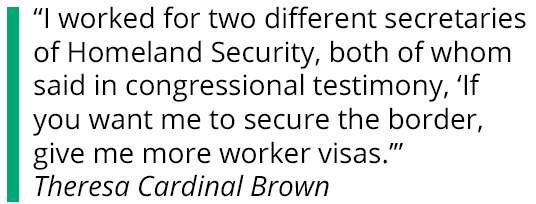 We can do both. We can secure the border, we should, but we can also provide additional workers through more legal immigration. And then the second issue is one of the other things we hear is, “Well, it’s going to take American jobs or it’s going to drive down American wages.” I actually think you can make a very strong case for being the exact opposite. Think back to the Tax Cuts and Jobs Act where we stopped, essentially, moving headquarters overseas. But we also stopped, I think, moving jobs overseas through tax policy. But the same thing will happen if we don’t have adequate workers. If you’re a corporation, if you’re a member of the Chamber [of Commerce] and you’re working internationally and in the US, your number one issue about where to locate a factory is going to be the workforce.
We can do both. We can secure the border, we should, but we can also provide additional workers through more legal immigration. And then the second issue is one of the other things we hear is, “Well, it’s going to take American jobs or it’s going to drive down American wages.” I actually think you can make a very strong case for being the exact opposite. Think back to the Tax Cuts and Jobs Act where we stopped, essentially, moving headquarters overseas. But we also stopped, I think, moving jobs overseas through tax policy. But the same thing will happen if we don’t have adequate workers. If you’re a corporation, if you’re a member of the Chamber [of Commerce] and you’re working internationally and in the US, your number one issue about where to locate a factory is going to be the workforce.
If we don’t have an adequate number of people to fill those positions for a new factory or even an existing factory, you’re going to move your operations somewhere else. So I think having an adequate number of workers will continue to drive a strong economy, which continues to create more jobs. And so my argument on this is if we don’t do this, we’re going to lose American jobs. It’s an add-to, it’s not detracting from American jobs.
DW Gibson:
And I would say that there’s a little bit of room in the union world, especially when it comes to trades and construction where they’ve come to understand this, I think in terms of quality of wages and so forth, and not wanting undocumented workers, for instance-
Representative Lloyd Smucker:
The union halls are empty right now as well, so they need additional bodies there to fill those spots as well.
DW Gibson:
Yeah, exactly. Exactly.
Randel Johnson:
More union dues too, you know. More workers, more union dues.
DW Gibson:
Exactly, exactly. More organizing to be done, right? Theresa, I want to turn to you on a point that Randy and Representative Smucker both alluded to in this relationship to issues we see at the border. We’re focused here on worker visas, but perhaps there’s some corollaries, right? When it comes to border management addressing illegal immigration in those dynamics at the border, talk about how this discussion about worker visas interacts with that as you see it in the work that you do.
Theresa Cardinal Brown:
Sure. So just to mention that I spent about six and a half years of my career working at Customs and Border Protection Department of Homeland Security. My tenure crossed between the latter half of the George W. Bush administration, the first part of the Barack Obama administration. I worked for two different secretaries of Homeland Security, both of whom said in congressional testimony, “If you want me to secure the border, give me more worker visas.” So there is absolutely a linkage. We hear a lot about many of the people coming to the border seeking asylum. And I think that is true. Some of them really do believe that they are being persecuted at home, and some of them have cases, but an awful lot of them are fleeing poverty, economic despair, where in the countries that they come from, that is caused by a whole lot of different things.
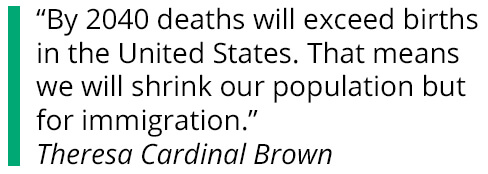 Everything from government corruption to activities of criminal cartels, to unsustainability of some of the agriculture that they’ve had for centuries where they lived. There are numerous reasons. But as the congressman started out by saying, our immigration system is not really conducive if you don’t have a high skill, high degree of education, but you’re willing to come and work. We don’t have a lot of opportunities to do that. We have seasonal visas in agriculture and non-agriculture, but we have a lot of year-round needs. And both Randy and the congressman mentioned some economic statistics. The Congressional Budget Office looked at our overall population growth, and that’s one of the ways they determine the budgetary impact of bills that are introduced in Congress. And they said that without immigration, by 2040 deaths will exceed births in the United States. That means we will shrink our population but for immigration.
Everything from government corruption to activities of criminal cartels, to unsustainability of some of the agriculture that they’ve had for centuries where they lived. There are numerous reasons. But as the congressman started out by saying, our immigration system is not really conducive if you don’t have a high skill, high degree of education, but you’re willing to come and work. We don’t have a lot of opportunities to do that. We have seasonal visas in agriculture and non-agriculture, but we have a lot of year-round needs. And both Randy and the congressman mentioned some economic statistics. The Congressional Budget Office looked at our overall population growth, and that’s one of the ways they determine the budgetary impact of bills that are introduced in Congress. And they said that without immigration, by 2040 deaths will exceed births in the United States. That means we will shrink our population but for immigration.
That has severe implications for economic growth, for job growth. As Randy said, it’s not that there are Americans that are sitting on the sidelines. The largest percentage of our population is over age 65. That’s the retirement population. And so as more and more people go into retirement, we are not giving birth to as many people to fill the labor force coming back and only immigration is going to create that positive population growth. Immigrants right now make up just under 19%, or almost one in five of every worker in the United States. And when I say immigrants, I mean immigrants of all statuses, including those who have become naturalized citizens, have green cards, have legal work visas, and those who are undocumented. I think it’s a testament to the labor issues we’re seeing in this country with an economy that has bounced back from Covid far better than almost any economist thought we would without huge increases in inflation.
We have seen inflation, don’t get me wrong, but we also haven’t gone into recession. And one of the main reasons economists are now attributing to that is that we have seen immigration in the last few years. Admittedly it’s mostly immigration coming from our US-Mexico border, but they’re not coming under a legal visa because it’s not available, but they’re having an economic impact. They’re actually helping our economy to that soft landing that all the economists and everybody and investors were hoping for, but we’re not done. Because again, without immigration, we would still face aging and declining domestic workforce. The last thing I would say is that the push for getting work permits for the immigrants who have arrived at the US-Mexico border is in part a demand from local economies saying, “They’re here and if we can get them working, one, they won’t be a drain on our local economy, and two, they’ll fill jobs that we haven’t been able to fill.”
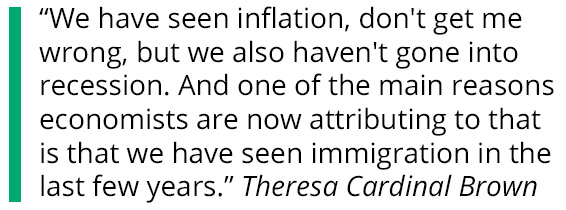 Now, different people will have different opinions about whether this is the best way to go about getting immigrant workers into our workforce, but the fact of the matter is, without an alternative visa scheme that doesn’t exist really in our immigration system right now, this is what is happening. Our economy continues to be a draw. Open jobs are an open call for immigrants to come no matter how they come. And I think that that is an important thing to recognize. That as long as our economy is doing so much better, not just than pre-Covid, but than any other country in the hemisphere and in most of the world, people are going to say, “Oh, that’s where I can do better and that’s where I will go.” So I would say that we have a lot of issues to work out at our US-Mexico border. We need to address our asylum system, but it’s worth considering that if we were able to create work visas, some portion of those who are arriving illegally to our US Mexico border would have a legal way to arrive that they don’t currently have.
Now, different people will have different opinions about whether this is the best way to go about getting immigrant workers into our workforce, but the fact of the matter is, without an alternative visa scheme that doesn’t exist really in our immigration system right now, this is what is happening. Our economy continues to be a draw. Open jobs are an open call for immigrants to come no matter how they come. And I think that that is an important thing to recognize. That as long as our economy is doing so much better, not just than pre-Covid, but than any other country in the hemisphere and in most of the world, people are going to say, “Oh, that’s where I can do better and that’s where I will go.” So I would say that we have a lot of issues to work out at our US-Mexico border. We need to address our asylum system, but it’s worth considering that if we were able to create work visas, some portion of those who are arriving illegally to our US Mexico border would have a legal way to arrive that they don’t currently have.
DW Gibson:
Congressman, I wonder how that sounds to you, and maybe dialing down on a specific point that Theresa and Randy make in the [white] paper about a proposal vis-à-vis healthcare industry. And this is something you touched on in your earlier comments, but we see this especially in rural areas in terms of access to doctors, in terms of this aging population that Theresa spoke about, in terms of elder care for our grandparents and our parents and so forth. I’m sure these are issues you hear about often. I wonder if you see that as a particular space as they did in the paper for expansion of worker visas, healthcare in particular, and the corollary between the dynamics we see at the border and possibility to create some relief there with proposals like the one you put forward.
Representative Lloyd Smucker:
I was talking recently in the last few days to some of the hospital systems in my area and talking about the shortage of nursing. We also have a large number of retirement communities in nursing homes here in my area who are experiencing severe shortages. This is impacting care that is important to all of us or to our maybe aging parents in the case of the retirement communities. So it is critical that we find workers here. And that’s one of the areas specifically addressed in this particular bill, we’ve focused on farm workers and in fact there’s been a farm worker modernization bill as well that added to workers coming into the farm system. And this bill was essentially a reaction to that saying, “Well, okay, I get it. Food supply is important and farm workers are important, but there’s all these other industries that really need people as well.” Healthcare is of course one of them.
I do want to get back to something Theresa said, and I think she’s correct. The immigrants that have come in over the past few years have helped to keep a soft landing, if you will, and have helped the economy. But it does put us at great risk when that’s not done legally. And so we know overwhelmingly most immigrants coming in illegally want to come here to provide for their families, but there are also those that potentially wish to harm us.
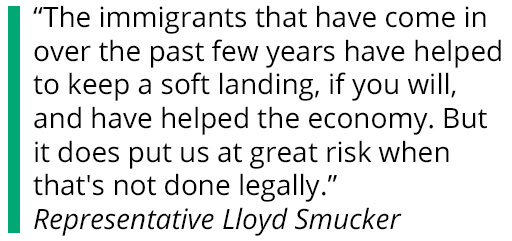 And then you have a porous border. We’re seeing human trafficking and drug trafficking on a scale that we haven’t seen before. We know people are coming from all across the world, including countries on the terrorist watch list. So it’s not sustainable for us to try to meet the immigration and worker demand in the way that we’re doing now, and it potentially could be a real disaster. So we’ve got to, and I think Theresa agrees with this, but we’ve got to secure the border, but at the same time, we have to really provide a legal way to have more workers in the system.
And then you have a porous border. We’re seeing human trafficking and drug trafficking on a scale that we haven’t seen before. We know people are coming from all across the world, including countries on the terrorist watch list. So it’s not sustainable for us to try to meet the immigration and worker demand in the way that we’re doing now, and it potentially could be a real disaster. So we’ve got to, and I think Theresa agrees with this, but we’ve got to secure the border, but at the same time, we have to really provide a legal way to have more workers in the system.
DW Gibson :
Theresa, any response to that or comment?
Theresa Cardinal Brown:
I think there’s been news reports and data that show that we have seen an increase in people with either criminal backgrounds or on the terrorist watch list arriving at the border. It is absolutely true that I agree. It’s unsustainable what is happening down there, and it is not ideal in any way, shape or form. I merely wanted to point out that one reason why people do come illegally is when there’s not a viable legal means to do so. And within, as you said, within that population that is mostly people just coming to work and some that are coming for true asylum and protection, others can take advantage of that flow and the fact that our border officers and agents are being overwhelmed. So it’s not a sustainable avenue. And I just mainly wanted to point out that it’s not about more immigrants, as I think the congressman said earlier, there’s this fear that more immigration is going to be bad for us somehow.
More immigration, just in general right now, especially where we are, is not necessarily going to be bad for us, but we have to figure out what is the means and mechanism by which we have those new immigrants come to the United States. Certainly, I don’t think there’s anybody who suggests that having them come illegally is the best way to do it. I don’t think that’s the case, but we need to consider what are the alternative legal avenues that we can create when our existing legal system is not meeting what is clearly a need. The last thing I’ll just point out, and Randy’s very aware of this as well, when we think about legal immigration avenues coming forward, the congressman’s bill is a temporary worker program. We have lots of temporary worker programs, but there’s also, I think, and this comes up every time we talk about immigration reform of the legal system, “What are the ways that some of those people can continue to stay in the United States on a green card?”
If we have ongoing workforce needs, there’s no reason for us to say that someone who has been here and working, I think the congressman’s bill would have somebody working maybe up to nine years, at the end of that period of time, if they’ve proven that they’re a good worker and employers like them, is there a reason that we would say, “No, you can’t get a green card.” What’s the mechanism to do that? And I think that’s another thing. We can start with temporary workers, and some will decide not to stay, but many will and many of their employers may want them. So we want to make sure that that process is workable. Right now, one of the big impediments we have in our legal immigration system is that there’s a mismatch between the number of temporary workers we admit and the number of green cards.
And what that means is that we end up with green card lines that are so long that people will die before they get the green card. We have too few green cards, too many people applying, and I think that’s not sustainable either. It’s an important thing that we look at, the ways that people can come and how they can meet these economic needs. I would say that in addition to temporary worker programs, we need to think about the long-term needs as well. And if green cards are a matter of making that process more straightforward, more streamlined, I think that’s another thing that we should consider.
Randel Johnson:
Right, and I would add that green cards have always been important to the unions and addressing the problem Theresa mentions is a big part of getting union buy-in to bills like this. And DW, maybe if I could just jump in too and just say as we’re winding down is one of the issues, Congressman: Is there a way to do something very narrow like the healthcare bill or something where the arguments are so clear, any congressman or woman can explain it to the American public so we can move forward with something narrow and get something done? I call it being the tip of the spear, and then maybe we see how that works and then we come back with a broader bill?
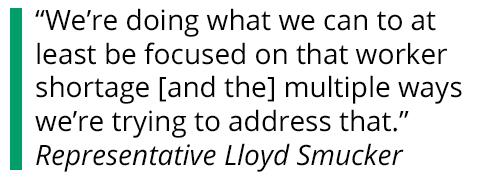 I’m just trying to plant that as something to think about. I know my other friends in the business community such as restaurants and construction are not going to be happy with what I just said, but is there something very narrow where it’s so obvious that we need these people and the services they provide? That’s my question on that one.
I’m just trying to plant that as something to think about. I know my other friends in the business community such as restaurants and construction are not going to be happy with what I just said, but is there something very narrow where it’s so obvious that we need these people and the services they provide? That’s my question on that one.
Representative Lloyd Smucker:
I think it’s a good point. We have to do this a step at a time. I mean, as I said, the 65,000-person limit or visa limit in this bill is very small. And this was done in reaction to, I think people understand food security and the need for workers in farm space, but like healthcare, yes, really you can make a strong argument there as well. And you can in any of these spaces. So I hope the time is here soon when we’re able to gain enough support and consensus around these ideas that we can begin to address this. So pick a way that we can do it, and I’m in. Wherever that is, we must be taking these steps to begin to solve this. So maybe we get past this election cycle and maybe next year will be the right time to start to move some of these, but we’re doing what we can to at least be focused on that worker shortage multiple ways we’re trying to address that. We’ve talked about some of those otherwise, but this is a really important part of it.
DW Gibson :
I think that the overwhelming sense of promise here is that the conversation becomes about, “Hey, how can we meet your needs, Americans, in terms of the communities you live in, your healthcare needs, your construction needs, your recreational needs in terms of that dinner out on the weekends and the restaurant you go to.” All these small touches, it’s about meeting the needs. And I think that’s a really good framing for the discussion moving forward.
Representative Smucker, so grateful for your time today talking about the bill. Theresa, Randy, thank you so much for joining us and we’re excited to share this with folks out there and turn their attention to it. We’re grateful for your work on it.
Representative Lloyd Smucker:
Thank you.
Randel Johnson:
Thank you, Congressman.
Theresa Cardinal Brown:
Thank you, Congressman.
Representative Lloyd Smucker:
Good meeting you.
Read More:
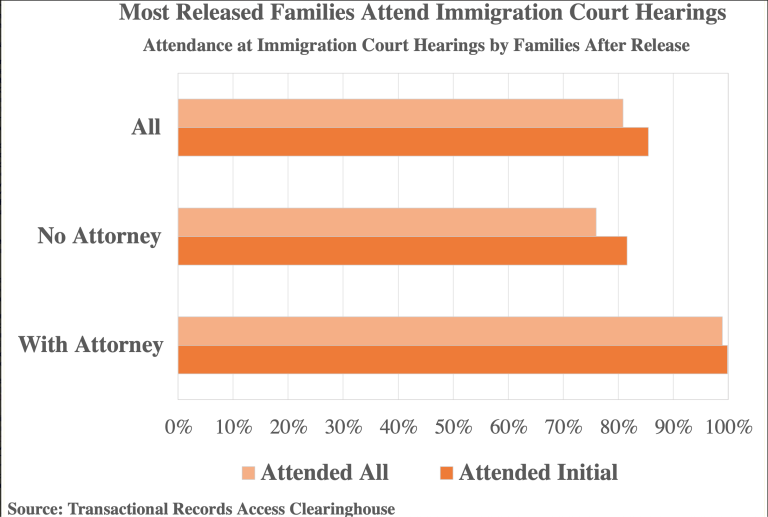
Congressional Note No. 2
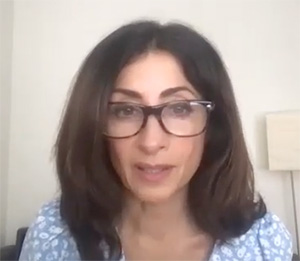
Capitol Hill Briefing No. 7

Strategic Inquiry No. 8
